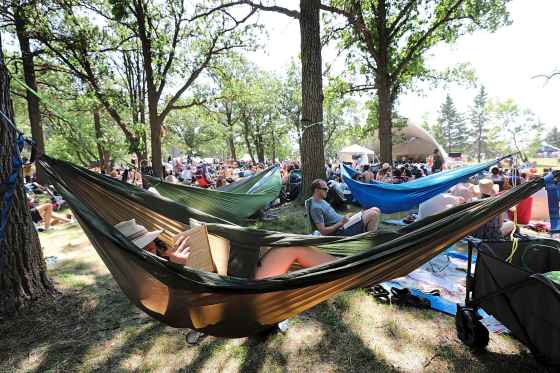|
This past weekend’s Pride parade and celebrations in Winnipeg drew thousands of people downtown and to The Forks — an especially impressive turnout considering the sweltering temperatures, which topped 33 C.
It is still that hot. It will continue to be that hot. It is the first week of June, people, and we’re suffering through weather that’s just as unwelcome but at least expected in late July.
It might seem cavalier to talk about how extreme heat is going to affect outdoor festivals when the country is literally on fire. But weather that affects us personally is actually weather that effects change in how we think about climate change, which can too often seem like a far-off problem.
Advertisement

At music festivals across Canada over the years, I’ve endured torrential downpours (and the resulting ankle-deep mud), and temperatures that have ranged from “surface of the sun” to “dark side of the moon.” I’ve battled bugs, heat exhaustion and one extremely scary storm that literally lifted a beer tent up off the ground and inspired my friend to put on her backpack so her body would be identifiable in case of a tornado.
These are all badges of honour to the hardy longtime festival-goer. But the prospect of spending several days outside in consistent 30-plus temperatures with minimal shade options gives me serious pause; I lack both the stamina and the desire for bragging rights I had as a younger woman.

People lay in hammocks reading under clusters of trees to keep cool while attending the Winnipeg Folk Fest at Birds Hill Park in 2018. (Ruth Bonneville / Winnipeg Free Press files)
Rob Brookman, the executive director of Adelaide festival in Australia, regularly deals with temperatures that exceed 40 C. In the Guardian, he said adapting a festival site to extreme weather is a slow process.
“Climate change continues to be a boiling-frog situation,” he said. “It’s far more gradual. The festival has dealt with all kinds of weather over the years but increasingly what we are dealing with is a less predictable pattern.”
It’s a concern that’s echoed by organizers of Standon Calling, a U.K. festival that draws 17,000 people. In 2021, despite normal weather forecasts, double the average rainfall for the month of July fell in four hours, flooding part of the site and forcing the festival to cancel its final day.
The next year, newly dug irrigation ditches went unused as the area suffered a freak heat wave.
“You’re now preparing for something that, even in the realms of extreme, is at the extreme end,” festival founder Alex Trenchard told the Guardian.
So yes, festivals are scrambling to deal with every eventuality, but lack of shade has long been an issue. However, solutions are tricky.
Liisa Ladouceur, an arts and travel writer in Toronto, is a Facebook friend of mine. In May, she attended the Cruel World festival in Pasadena, Calif., featuring such acts as Siouxie, Iggy Pop, Echo and the Bunnymen, and Love and Rockets — a dream lineup.
However, the experience left her discouraged and disheartened. She found she had to skip bands she wanted to see early in the day, knowing she’d never make it to the headliner if she spent 10 hours in the sun; she was already half wiped out after the arduous walk from the parking lot.
The answer seems simple: provide more shade. But that’s not how festivals are set up — structures that provide shade are also structures that block sightlines. Even umbrellas and parasols can obscure the views of other patrons.
Knowing her aversion to blazing heat, Ladouceur’s friends advised her to purchase an upgraded ticket called “general admission plus” that promised additional shelter. Unfortunately, although the shaded area under a huge tent included comfy couches and nice washrooms, it was not within view of any of the three stages, the welcome respite from the sun thereby providing an unwelcome respite from the music.
“I don’t want to paint Cruel World as being cruel,” she told me. “Because I do think they were trying. The reality is, they need to try more.”
It’s a challenge festivals the world over are going to have to tackle, and soon.
|

